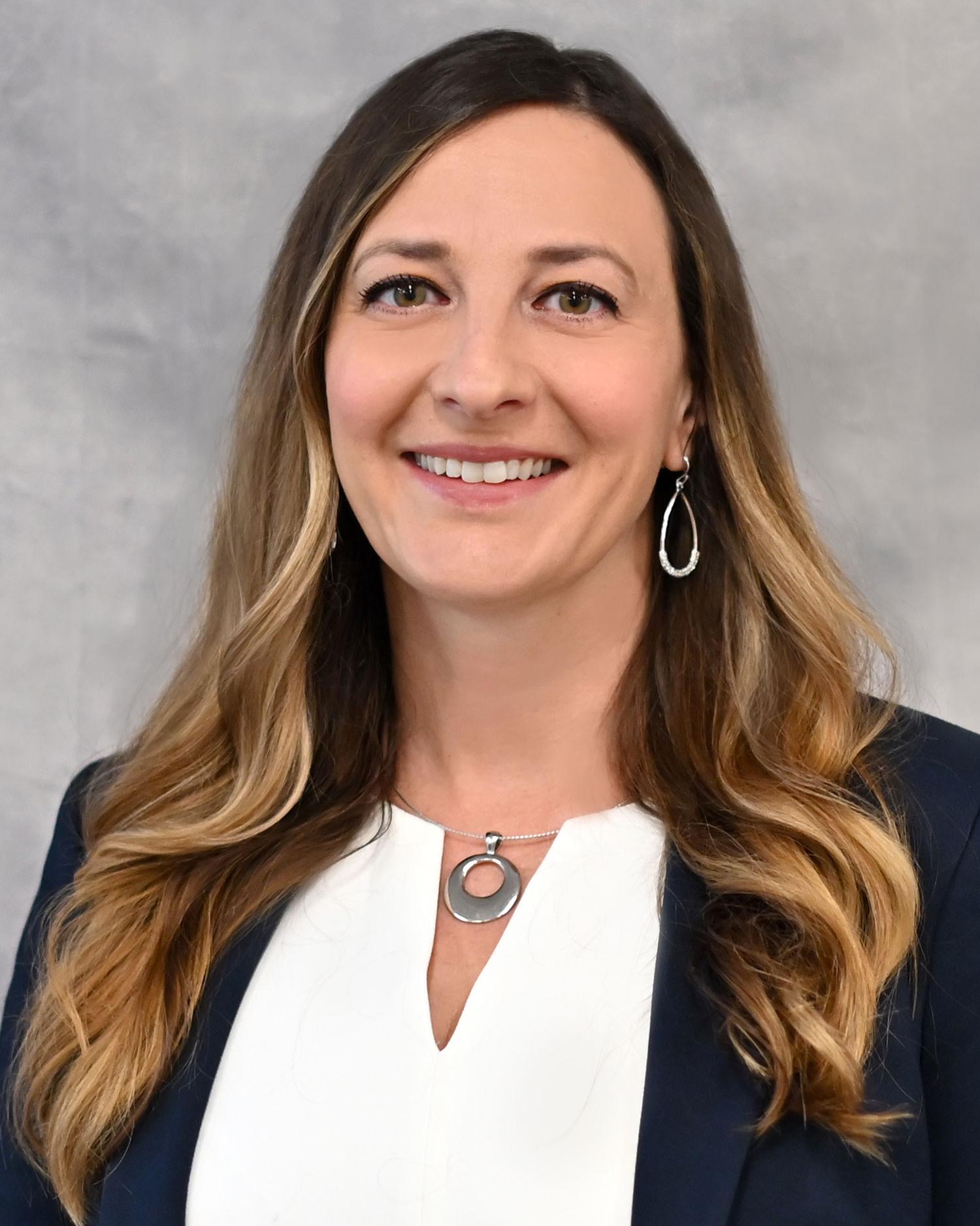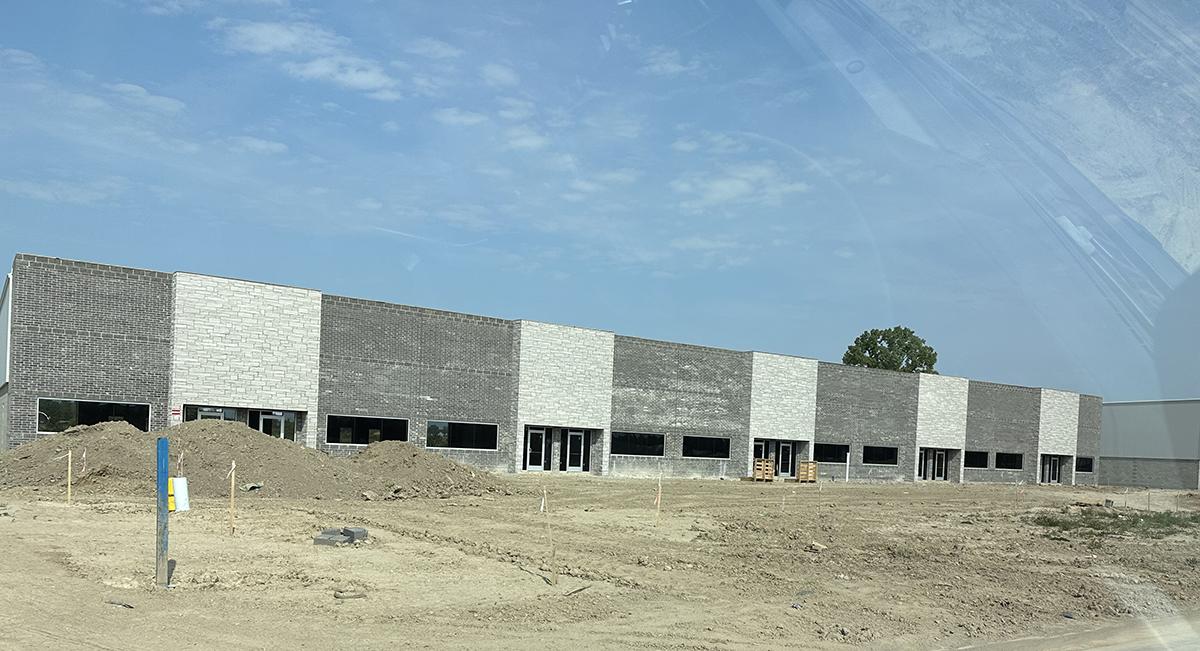Table of contents
Message from Vicky Rowinski

Welcome to the Macomb Business Insider Summer edition prepared by the Macomb County Department of Planning and Economic Development (MCPED).
One of our marketing efforts this year has been centered around a theme called “Building Tomorrow Today.” This messaging recurs in all of our program areas, whether it is strategizing the future aspects of accessing Lake St. Clair or immersing our businesses in the latest industry innovations. We are in a constant state of thinking, planning, executing and implementing. In order to move a mountain, it takes moving one small rock at a time, and our team has been relentless in its efforts to make Macomb County the best place to live, work and play.
As summer winds down, we hope you have had the opportunity to enjoy the many recreational resources available in Macomb County. Last month, we celebrated Lake St. Clair in our annual State of the Lake address at MacRay Harbor in Harrison Township. The event highlighted some of the successes of the Blue Economy Initiative, an effort to protect and enhance the lake and its tributaries. The address also unveiled the first-ever Lake St. Clair Coastal Study. The report establishes a baseline of current water assets and quality of life amenities within a 12.1 square-mile Coastal Area of Study along the lake’s shoreline. It will be used to market the region, address deficiencies and opportunities, and support funding requests that will strengthen the natural asset and its surrounding areas.
This pattern of activity has also carried over into our economic development team. To date, our team has assisted in more than 38 expansion and attraction projects, with a total investment of over $683 million, creating and retaining more than 1,020 jobs.
Some of our business success stories are featured in this newsletter, including tax breaks for an expansion project at MISC Products and the successful use of an Industry 4.0 Implementation Grant at Synergy Additive Manufacturing. These grant funds are still available through the state of Michigan, and more details can be found in this newsletter
We also discuss the benefits of seeking speculative building status when constructing a new industrial building.
Beyond our day-to-day, we are also engaged in several grants that impact many of our communities and the people who reside there.
We have two surveys currently underway which we need your help with outreach and participation. Please feel free to share these with your friends, family, residents and constituents.
- The Macomb County Child Care Coalition survey is helping us examine the child care ecosystem in Macomb County.
- The Tri-County Broadband Study will help us gain a clearer picture of internet access around the county.
Thank you for taking the time to read about our updates and please feel free to reach out if we can assist you. Make sure to follow us on Facebook and LinkedIn for our latest news.
Vicky Rowinski
Director – Macomb County Planning and Economic Development
Recent successes

I4.0 Implementation Grant helps company save time, money repairing worn parts
Thanks to an MEDC Industry 4.0 Implementation grant, Clinton Township-based Synergy Additive Manufacturing LLC has developed a cost and time saving way to repair worn parts that is also environmentally friendly.
The plan was shared by Automation Alley.
In the machining industry, the spindles of CNC machines wear out over time, creating vibrations and machining errors. The current solution, hard chrome coating, uses hexavalent chromium, which presents significant environmental concerns. The process is time-consuming, with delivery times ranging from 5-10 days, leading to costly downtime.
With the help of the Macomb County Department of Planning and Economic Development (MCPED), Synergy was able to acquire an Industry 4.0 implementation grant. The grant assists small manufacturing businesses with the purchase and implementation of hardware and software technologies associated with Industry 4.0. MCPED contacted Synergy directly, made them aware of the grant, encouraged them to apply and walked them through the application process.
With the grant money, Synergy Additive Manufacturing established a laser additive manufacturing-based CNC spindle remanufacturing facility. The grant was used to add a robot and laser equipment to repair worn-out spindles efficiently and environmentally friendly. The laser-based additive manufacturing process cuts the repair time from days to just 10-30 minutes. Implementation of the new technology took place over a period of 3-4 months.
The new robotic system helped Synergy increase capacity, cut down delivery time and improve the quality of its services. With the help of the grant, Synergy was able to revolutionize its CNC spindle repair process, enhance environmental sustainability, reduce downtime and increase revenues.
MCPED has awarded its allotment of implementation grant funding for 2023. But more funding is still available through the state of Michigan and the Michigan Economic Development Corporation (MEDC). The grant provides a 50% reimbursement up to $25,000 for technology costs that qualify.
The Macomb County Department of Planning & Economic Development is engaging with businesses through the Macomb Next initiative. The Macomb Next goal is to educate businesses on the pillars of I4.0. Those pillars include cybersecurity, virtual and augmented reality, big data and analytics, advanced robotics and automation, additive manufacturing (3D printing), system integration, advanced simulation, cloud computing and The Internet of Things.
The grant money helps provide a general education about Industry 4.0 practices through five I4.0 workshops scheduled throughout 2023, technology assessments provided by the Michigan Manufacturing Technology Center (MMTC), and funds purchase of new technology. (The assessment is required to be considered for funds for the purchase of new technology.)
The grant ends on May 31st 2024.
To learn more about obtaining an Industry 4.0 Implementation grant, please contact the Macomb County Office of Planning and Economic Development at 586-469-5100.
Industry 4.0 implementation grant monies still available
Industry 4.0 Implementation Grant monies are still available for interested and eligible Macomb County companies.
The Macomb County allotment of grant money supplied by the Michigan Economic Development Corporation (MEDC) to Macomb County businesses has been fully awarded, but grants are still available through the state of Michigan.
The money would be used to assist small manufacturing businesses with the purchase and implementation of hardware and software technologies associated with Industry 4.0. The grant provides a 50% reimbursement up to $25,000 for technology costs that qualify.
To date, 21 small- or medium-sized manufacturers in Macomb have been awarded a grant, totaling $475,000. The 21 businesses are investing more than $3.5 million in hardware/software associated with I4.0 and creating 57 new jobs.
Contact MCPED Senior Business Developer Todd Seibert at 586-469-6298 to find out if your company is eligible for grant money. To learn more about the Technology Implementation grant program and submit your application, visit michiganbusiness.org/industry4-0/grant/.
Industrial developers can gain competitive edge by applying for ‘speculative building’ status

Developers erecting industrial buildings with the hope of gaining tenants after construction can gain an edge on the competition by planning to have the building receive a “speculative building” designation by the local municipality. This speculative designation allows a developer up to nine years to find a tenant.
Under Act 198, established in Michigan in 1974, “speculative buildings” allow the new tenant to apply for an Industrial Facilities Tax Exemption Certificate (IFEC). The certificate holder receives a 50% abatement on their real property taxes for up to 12 years. In addition, the Michigan Economic Development Corporation (MEDC) may offer to abate some or all of the 6-mill State Education Tax for qualifying projects.
The speculative building designation allows the building owner to attract prospective tenants without time constraints. And the property owner has the potential of charging more for rent since the tenant will be receiving substantial tax relief it may not receive elsewhere. If the newly erected industrial building doesn’t have “speculative building” status, the incoming tenant is not eligible to apply for a tax abatement.
Industrial property eligible for a tax abatement includes real property improvements, buildings and structures. Eligibility for abatement applies whether the industrial property is owned or leased.
Speculative building designation is generally targeted to corporate offices, research and development, technical centers and manufacturing or logistic uses.
According to the act, there are two types of new facilities available to the industrial users – the speculative building, and what is commonly referred to as the design/build facility. With the design/build, the user consults with the builder/developer regarding the user’s particular needs. A building is constructed to meet the user’s particular needs. And the user waits until the building is constructed, which generally takes less than a year for a small manufacturing facility. While tax abatements are also available under this scenario, the time to obtain them is limited. With the design/build facility, an application for a tax abatement by the tenant must be made within six months of physical work beginning on the project. The developer is not an eligible applicant for a tax abatement.
With a speculative building, occupancy is immediate. Once the tenant is located, tax abatement forms are filled out regarding buildout of the facility.
A speculative building is defined as:
- a new building that meets the criteria
- a building that receives that designation from the local municipality and is located in an industrial development district.
- a building that is constructed for the purpose of providing a manufacturing facility before the identification of a specific user of that building.
- a building does not qualify as a replacement facility. Rehabilitated or replacement facilities are not included in the definition.
The first step to obtain a “speculative building” designation is to submit an application to the local governmental unit in which the facility is to be built. When the application and all accompanying documentation have been submitted, the application is scheduled for a public hearing before the governing body of the local unit. If the application is approved, the local governmental unit must adopt a resolution designating the facility as a “speculative building,” thereby saving the opportunity for tax abatement for a future qualified user.
Macomb County Planning and Economic Development can help developers with this process as well as help tenants apply for their IFEC.
Recently, Senior Economic Developer Curt Chowanic helped a developer receive “speculative building” status on two buildings in Bruce Township south of 33 Mile Road and west of Powell. At the time of the designation, no tenants were identified to occupy the buildings. The Economic Development team presented the speculative building designation option to the developer as a way to help attract more and better jobs to Bruce Township and to allow him and his future tenant to remain competitive in the marketplace. When an eligible tenant is identified, it will be able to apply for an IFEC and receive a 50% abatement on real property taxes for up to 12 years.
To learn more about speculative building status or request assistance in applying for ‘speculative building” designation, contact Macomb County Planning and Economic Development at 586-469-5100.
MCPED helps company gain tax break for expansion project
MISC Products Inc., a Macomb Township-based manufacturer, has been able to expand its facility and train its workforce with the help of Macomb County Planning and Economic Development (MCPED).
In August 2022, the company contacted MCPED with a desire to expand the size of its current facility by 1,600 square feet.
MISC Products is a high-volume, custom manufacturer who creates webbing, cord and other narrow fabric assemblies. Having contracts with many of the world’s largest automobile manufacturers led the company to seek more space for production and research and development.
The MCPED team met with MISC to discuss all of the resources and incentives that were available, including an industrial facilities exemption certificate (IFC). The IFC provides a tax incentive to manufacturers, allowing them to renovate and expand aging facilities.
The first step to expand the building was applying to create an industrial development district. The application to create an industrial district was submitted, and in November 2022, the township board voted to approve the district. Next, an application for an industrial facilities tax abatement was submitted. MCPED worked closely with MISC Products and Macomb Township to request the district and apply for the tax exemption.
In June, the township board approved the request and created the tax exemption.
With a larger facility on the horizon and an increase in production capability, MISC Products realized it would need more resources and more talent training.
MCPED directed the company to Macomb Community College’s Workforce and Continuing Education Department. MCC oversees the Michigan New Jobs Training Program. MNJTP allows community colleges to provide free training for employers who are creating new jobs and/or expanding operations in Michigan.
As a department, MCPED is dedicated to attracting, retaining and growing businesses. MISC Products is a perfect example of a business that used due diligence to find out what assistance was available and then utilizing all of the resources and incentives available to assist its expansion.
If your company is looking to expand or relocate to Macomb County, please contact Macomb County Planning and Economic Development for assistance at 586-469-5100.
STC grant program available to small- and medium-sized automotive manufacturers

Many of Greater Detroit’s small- to medium-sized automotive manufacturers (SMMs) suffered greatly during the COVID-19 pandemic with supply chain issues as well as an industry shift to electric vehicle (EV) products and technologies.
But a new program has been formed to renew the strength of the region’s mobility supply chain as well as retain and develop needed manufacturing capabilities and retain jobs at at-risk companies.
The Advanced Mobility Supply Chain Transformation Center (STC), part of the University of Michigan Economic Growth Institute and the Global Epicenter of Mobility (GEM), will assess manufacturers' needs and connect them with the technical assistance necessary to help them stabilize, diversify, grow, and/or responsibly succeed in ownership transition.
The STC will provide eligible companies with a plan to develop and/or maintain stability and growth by offering:
- A “deep dive” assessment of the company
- A company valuation
- Development of an opportunity plan
- Up to $100,000 in matching funds for technical assistance projects for qualified companies
To be eligible, a company must be located in the GEM, which includes 11 counties in the greater Detroit area, including Macomb County. The company must employ less than 500 people (in total for all locations). And, at least 10% of annual business revenue for the company must come from the mobility sector either currently or within the last five years. But if companies don’t need the 10% standard, they may still be eligible if they show the critical potential to address a particular need in the advanced mobility supply chain.
The initial assessment process includes the application, a NDA, a daylong site visit, valuation and opportunity plan development, and project opportunity identification.
GEM has partnered with the Michigan Economic Development Corporation, the Detroit Regional Partnership, Techtown Detroit, and SEMCA Michigan Works!.
If your company is interested in receiving assistance from the STC, contact our Macomb County Planning and Economic Development office at 586-469-5100.
Department Happenings
Lenney wins fellowship award
Our own Hali Lenney, a senior economic development specialist for Macomb County Planning and Economic Development (MCPED), has won the Birgit M. Klohs Fellowship Award from the Michigan Economic Developers Association (MEDA).
Lenney will receive the $2,000 fellowship award in August. She will use it to upscale her education and knowledge in economic development by attending the Annual Women in Economic Development Forum in Chicago in October. Lenney was one of two award recipients in the state.
The goal of the Birgit M. Klohs Fellowship is to increase women and minority participation in economic development in a way that supports MEDA’s membership, its committees, and the organization as a whole, by increasing opportunities for the education needed to build each recipient’s skills and abilities in economic development.
Birgit Klohs first joined MEDA in 1977 and was one of MEDA’s first three female members. She retired a few ago after 33 years of leadership at The Right Place, Inc. following a highly successful career.
Lenney started with MCPED in June 2021.
Fueling the Talent Pipeline
It’s that time of year again!
It won’t be long until summer turns to fall, and school will soon be back in session. High school and middle school/junior high teachers will be looking for help from local employers as they plan different events for their students.
The goal? To expose these students to various career paths and fuel their interests for what may await them after high school.
The Macomb County Department of Planning and Economic Development partnership with school districts and local manufacturers reveal much-needed, well-paying jobs in the industry.
Some of the events coming up this Fall include:
- Manufacturing Day
- MICareerQuest
- Southeast and Careers in Manufacturing Expo.
These are just three of the bigger events in our region. There are so many more that will be taking place within specific school districts.
Is your business interested in getting involved with the future workforce of Macomb County? If the answer is yes, you really need to consider the Macomb County Fueling the Talent Pipeline (FTTP) initiative.
The goal of FTTP is twofold. It connects employers in Macomb County with educators, to provide meaningful career exploration activities for students and prepare our future workforce for the variety of interesting, well-paying, and high-demand career fields that are out there. As a result, students are better prepared to graduate from high school with a plan on how to pursue careers that interest them.
At the same time, Macomb County employers have built relationships with these students and schools by getting involved in events such as industry tours, job-shadows, internships, career fairs, advisory boards, class presentations and so much more.
These students, when looking for career opportunities in their fields of interest, may end up working for you some day.
We are currently seeking local employers who are ready to invest in their future workforce. If interested, go to our Fueling the Talent Pipeline, fill out the form, and our specialist will get in touch with you.
Jennifer Weot is the senior outreach specialist for Fueling the Talent Pipeline in Macomb County Planning and Economic Development.
What's next?
Look for us at these upcoming events where we will be working to improve our services to Macomb County:
- MEDA Annual Conference, Aug. 13-16 at the Northern Center at Northern Michigan University in Marquette
- Ground Vehicle Systems Engineering and Technology Symposium (GVSETS), Aug. 15-17 at the Suburban Collection Showplace in Novi
- AIAM AeroOne Summit, Sept. 5-7, at the Detroit Marriott at the Renaissance Center in Detroit







